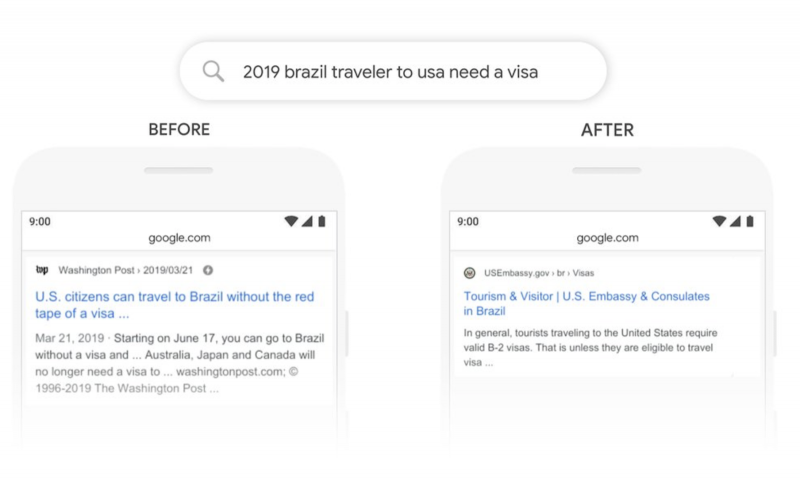2020 is almost over, and what a year it has been!
Apart from COVID-19, lockdowns, U.S. Elections, and wildfires, 2020 has also been pretty significant in terms of SEO news and updates. If you were too busy with all the other “2020 stuff”, you might have missed some of the big SEO news.
To help you catch up, here is a rundown of 5 big SEO news.
Google BERT — at almost 100%
Last year in November, Google shared its big update, Google BERT.
According to Google, “Unlike recent language representation models, BERT is designed to pre-train deep bidirectional representations from unlabeled text by jointly conditioning on both left and right context in all layers.”
In other words, BERT made Google smarter and better equipped to present users relevant results, based on the context of their search query.
Here is an example shared by Google that demonstrates how BERT makes Google search results more relevant and helpful.

When BERT was announced last year, it was expected to affect 10 percent of total search queries. However, earlier this year, Google confirmed that BERT is now affecting almost 100% search queries.
As per the announcement, “We’re excited to share that BERT is now used in almost every query in English, helping you get higher quality results for your questions.”
Because of the introduction and ever-growing influence of Google BERT, relevance has become an even more important part of the SEO equation. You can target the keywords, create backlinks, and optimize the user experience on your website.
However, if your content is not relevant — if your web page does not answer the questions the user may have in mind — it will have a tougher time to rank higher in the SERPs, regardless of how well the page is optimized for keyword phrases.
A few weeks ago, Google’s John Mueller also shared some insights on how BERT possibly affects exact match keywords.
According to John, “BERT is essentially a machine learning set up, I believe for understanding essentially the content a little bit better. So the queries that people type in, understanding those better and understanding your page’s content a bit better.
And with all of these… machine learning approaches, we try to figure out what these pages are actually about, what the query is actually looking for and we try to match that a little bit better.”
John also explained that as SEOs, “you don’t need to have singular and plural versions on your page. You don’t need to have all of the common misspellings on your page.
All of those things are less critical on your pages as long as you really match what the user is actually looking for.”
Google moved the Rich Results Test out of beta
In July 2020, Google also moved the Rich Results Test out of beta and decided to deprecate the Structured Data Testing tool.
Google believes that the new Rich Results Test tool will help SEOs by:
- Rendering both the desktop and mobile versions
- Fully aligning with Google Search Console reports
- Showing which Search feature enhancements are valid for the markup
- By dynamically loading structured data markup more effectively.
You can learn more about the news and its potential impact in the official announcement blog post by Google.
The August update wasn’t actually an update
In August, Google released a massive update that shifted the rankings from many websites, or so we thought.
Turned out that it wasn’t an update by Google. It was just a glitch.
According to the Search Engine Roundtable: "Yesterday afternoon I reported on one of the biggest Google updates we have seen in a long time. It was so big, and the results were so all over the place, many suspected it was a bug. And a bug it was.
A Google spokesperson confirmed with me over email last night, 'I confirmed with the team that this is a bug that we are fixing but still in the process of fully diagnosing, so we don't have specific details to share right now.'"
There is not much to look into here. Just know that if you experienced a sharp or increase decrease in traffic during August this year, it was probably because of that glitch.
You should also take that into account when measuring EOY traffic and setting goals for 2021.
Google to get better at identifying misspelled words, video content, and individual passages
Google also recently announced a host of new AI updates that would improve how Google’s search algorithms work.
To summarize the three big updates, Google will get better at:
- Identifying misspelled words in content,
- Identify key moments in a video that is more relevant to the search query, and
- Index and identify individual passages on a web page.
“We have recently made a breakthrough in ranking and are now able to not just index web pages, but individual passages from the pages. By better understanding the relevancy of specific passages, not just the overall page, we can find that needle-in-a-haystack information you are looking for.”
We have already covered all these updates in a recent blog post. If you are interested in learning the details of each update and announcement, check out our blog post: Google to make multiple changes to search algorithms and results.
Google announced the date for core web vitals ranking signals
Earlier this year, Google also confirmed that the Core Web Vitals would become a search engine ranking signal in May 2021. According to Google, this will combine core web-vitals and previous user experience signals.
Specifically, the previous ‘page experience’ ranking signal will combine Core Web Vitals with the following signals:
- Intrusive interstitial guidelines
- HTTPs security
- Mobile friendliness of the website
- Safe browsing experience for users
The Core Web Vitals are:
- LCP or Largest Contentful Paint. The time it takes for the main content on the page to load. Ideally, it should not take more than 2.5 seconds.
- First Input Delay. The time it takes for the page to become interactive. Ideally, it should not take more than 100 milliseconds.
- Cumulative Layout Shift. The unexpected layout shift of visual content on the page. Ideally, it should be less than 0.1
According to Google, “these signals measure how users perceive the experience of interacting with a web page and contribute to our ongoing work to ensure people get the most helpful and enjoyable experiences from the web.”
Conclusion
Some of these updates and news will likely not have any impact next year. However, most of these updates — especially, Google BERT and Core Web Vitals — will continue to play a big role in 2021.
Knowing what the update is and what it possibly affects is the first step towards improving your website and preparing for what’s next.
If you have any questions about any of these updates or SEO in general, leave a comment below and let us know.
Here’s hoping for a much better 2021 for everyone!
